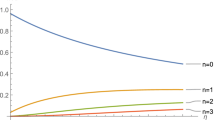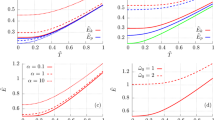Abstract
A recent paper of Dekker on the quantization of dissipative systems is examined in some detail. It is argued that one can construct a large number of classical equivalent Hamiltonians for damped systems. These can be formally quantized according to Dirac's method, and the resulting equations are mathematically consistent, but yield different eigenfunctions for the same classical system. However, this procedure should be rejected on physical grounds. That is in quantum mechanics, unlike classical dynamics, the definition of the time derivative of a dynamical variable is unique, and is given by the commutator of the proper Hamiltonian (or the energy operator) and that variable. If the proper Hamiltonian is used for the quantization of a damped system, then the quantal equations are inconsistent for the cases where the rate of energy dissipation depends on the velocity of the particle. As an alternative approach to the quantal theory of dissipative phenomena, a generalization of the Hamilton-Jacobi formalism is considered, where the equation for the principle functionS, depends not only on the space and time derivatives ofS, but onS itself. This leads to a new class of damped systems in classical mechanics. The original Schrödinger method of quantization via the Hamilton-Jacobi equation has been applied to this class of dissipative systems, with the result that the wave equation in this case is a solution of a non-linear Schrödinger-Langevin equation. This formulation has no analogue in the Hamiltonian approach, since in the latter, the resulting wave equation is always linear.
Similar content being viewed by others
References
Dekker, H.: Z. PhysikB21, 295 (1975)
Brittin, W.E.: Phys. Rev.77, 396 (1950)
Currie, D.G., Saletan, E.J.: J. Math. Phys.7, 967 (1966)
Razavy, M.: Can. J. Phys.50, 2037 (1972)
Schrödinger, E.: Ann. Physik79, 361 (1926)
Kostin, M.D.: J. Chem. Phys.57, 3589 (1972)
Kostin, M.D.: J. Stat. Phys.12, 145 (1975)
Havas, P.: Nuovo Cim.5, 363 (1957)
Razavy, M., Kennedy, F.J.: Can. J. Phys.52, 1532 (1974)
Kennedy, F.J. (Private communication)
Nambu, Y.: Phys. Rev.D7, 2405 (1973)
Dekker, H. (Private communication)
Senitzky, I.R.: Phys. Rev.119, 670 (1960)
Pars, L.A.: A Treatise on Analytical Dynamics, p. 268, New York: John-Wiley and Sons 1965
Albrecht, K.: Phys. Lett.56B, 127 (1975)
Kan, K.K., Griffin, J.J.: Phys. Lett.50B, 241 (1974)
Hasse, R.W.: J. Math. Phys.16, 2005 (1976)
Author information
Authors and Affiliations
Additional information
Supported in part by a grant from the National Research Council of Canada.
Rights and permissions
About this article
Cite this article
Razavy, M. On the quantization of dissipative systems. Z Physik B 26, 201–206 (1977). https://doi.org/10.1007/BF01325274
Received:
Revised:
Issue Date:
DOI: https://doi.org/10.1007/BF01325274




